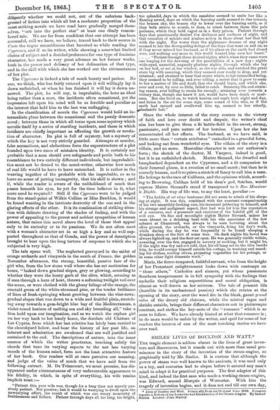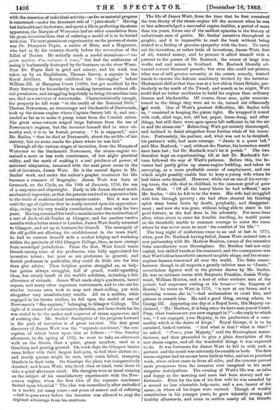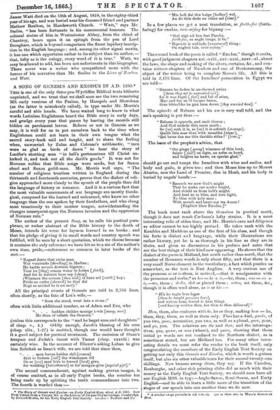SMILES' LIVES OF BOULTON AND WATT.*
THE tragic element is seldom absent in the lives of great inven- tors and discoverers, but it stands out with more than usual pro- minence in the story of the invention of the steam-engine, as graphically told by Mr. Smiles. It is curious that although the power of steam was well known to the ancients, it was used only as a toy, and centuries had to elapse before it entered any man's mind to adapt it for practical purposes. The first adapter of this kind, and indeed the first man who made a working steam-engine, was Edward, second Marquis of Worcester. With him the tragedy of invention begins, and it does not end till our own day, • Lives of Bouliim and Wait. Principally from the Original Soho MSS. Compris- ing also a History of We Invention awl Introduction of the Steam-Engine. By Samuel Smile.. London: John Murray. with the cessation of individual activity—as far as material progress is concerned—under the dominant rule of "joint-stock." Having lost his health and his fortune, and spent a life in perfecting the steam apparatus, the Marquis of Worcester had no other consolation from his great invention than that of ordering a model of it to be buried with him. The next prominent experimenter on the powers of steam was Dr. Dionysius Pepin, a native of Blois, and a Huguenot, who had to fly his country shortly before the revocation of the Edict of Nantes. He actually made a model steamboat—" use petite machine d'un vaisseau it roues," but had the misfortune of seeing it barbarously destroyed by the boatmen on the river Weser. Poor Dr. Pepin died in grief and misery, and his work was taken up by an Englishman, Thomas Savery, a captain in the
Royal Artillery. Savery exhibited his " fire-engine " before William III. at Hampton Court (1698), but got snubbed by the Navy Surveyor for his audacity in making inventions without offi- cial permission, and struggling hopelessly to bring his machine into use, died as a surveyor of waterworks. Characteristically enough, the property he left went "to the credit of the National Debt." Thomas Newcomen, an ironmonger and blacksmith of Dartmouth, took up the steam-engine where Captain Savery left it, and suc- ceeded so far as to make it pump water from the Cornish mines. The great mine-owners reaped large fortunes from the use of Newcomen's engines, but the inventor himself died in utter ob- scurity and, it is to be feared, poverty. "It is supposed," says Mr. Smiles, "that he died at Dartmouth, about the middle of last century, but no atone marks the place where he was laid."
Through all the various stages of invention, from the Marquis of Worcester to the blacksmith Newcomen, the steam-engine re- mained a more or less rude contrivance, of but slight practical utility, and the merit of making it a real producer of power, of universal adaptation, remained with the next great name in the roll of inventors, James Watt. He is the central figure in Mr. Smiles' work, and under the author's graphic treatmeut his life becomes a romance of biography. James Watt was born at Greenock, on the Clyde, on the 19th of January, 1736, the son of a carpenter and shipwright. Early in life James showed much mechanical ingenuity, so that his parents resolved to apprentice him to the trade of mathematical instrument-maker. But it was not until the age of eighteen that he really entered upon his apprentice- ship, owing to his very weakly constitution, and then only for two years. Having remained for twelve months under the instruction of a sort of Jack-of-all-Trades at Glasgow, and for another twelve months with abetter master in London, James Watt finally returned to Glasgow, and set up in business for himself. The monopoly of the old guilds not allowing his establishment in the town itself, he had to content himself with a modest lodging and workshop within the precincts of Old Glasgow College, then, as now, exempt from municipal jurisdiction. From the first, Watt found warm friends among some of the professors, who fully appreciated his inventive talent ; but poor as are professors in general, and Scotch professors in particular, they could do little else for him than give advice. Thus helpless genius struggled on, as help- leis genius always struggles, full of grand, world-upsetting ideas, but utterly bereft of the world's solidities, including a fair allowance of victuals. James 'Watt made ship's quadrants, barrel organs, and many other ingenious instruments, and to eke out his slender income even took to map and chart-selling, yet with altogether very unsatisfactory results. All on a sudden, while engaged in his brown studies, he fell upon the model of one of Newcomen's "ire-engines," belonging to Glasgow College. The sight of it aroused all his inventive faculties, and henceforth his lot was sealed to be the maker and improver of steam apparatus, and of nothing else. Mr. Smiles' description of his progress forward in the path of invention is of great interest. The first great discovery of James Watt was the "separate condenser," the con- ception of which burst upon him as follows :--" One Sunday afternoon, in the spring of 1765, he went to take an afternoon walk on the Green, then a quiet, grassy meadow, used as a bleaching and grazing ground. On week-days the Glasgow lassies came hither with their largest kail-pots, to boil their clothes in ; and sturdy queens might be seen, with coats kilted, tramping blankets in their tubs. On Sundays the place was comparatively deserted, and hence Watt, who lived close at hand, went there to take a quiet afternoon stroll. His thoughts were as usual running on the subject of his unsatisfactory experiments with the New- cornea engine, when the first idea of the separate condenser flashed upon his mind." The idea was immediately after embodied in a model, yet many years— sad years of sorrow and of suffering —had to pass away before the inventor was allowed to reap the slightest advantage from his exertions. The life of James Watt, from the time that he first conceived the true theory of the steam-engine till the moment when he was at last acknowledged a successful engine-builder, a period of more than ten years, forms one of the saddest episodes in the history of unfortunate men of genius. Mr. Smiles' narrative throughout is graphic, and it is impossible to read the book without being- stirred to a feeling of genuine sympathy with the hero. To carry out his invention, or rather train of inventions, James Watt, first of all, wanted money, and to procure it allied himself with a partner in the person of Dr. Roebuck, the owner of large iron works and coal mines in Scotland. Dr. Roebuck liberally ad- vanced several thousand pounds; but even this could not procure what was of still greater necessity at the outset, namely, trained hands to execute the delicate machinery devised by the inventor. Mechanical skill at that time was at a low ebb in Great Britain, par- ticularly so far north of the Tweed; and search as he might, Watt could find no better mechanics to build his engines than ordinary tinmen and blacksmiths. Of course, these men, quite unaccus- tomed to the things they were set to do, turned out villanously lotd work. One of Watt's greatest difficulties, Mr. Smiles tells us, "consisted in keeping the piston tight. He wrapped it round with cork, oiled rags, tow, old hat, paper, horse-dung, and other things, but still there were open spaces left sufficient to let the air in and the steam out." Before long Watt got entirely discouraged, and inclined to desist altogether from further trials of his inven- tion. Fortunately, his partner, and, what was not to be despised, his partner's wife, had more courage. "Jamie is a queer lad,"" said Mrs. Roebuck, "and, without the Doctor, his invention would have been lost ; but Dr. Roebuck won't let it perish." The two therefore kept on experimenting, till at last Dr. Roebuck's for- tune followed the way of Watt's patience. Before this, the in- ventor had partly given up steam-engine building, and taken to surveying, as a more profitable source of employment, and one which might possibly enable him to keep a young wife whom he had taken unto himself. However, while out on one of his survey- ing tours, the wife died in childbed, to the immense grief of poor James Watt. "Of all the heavy blows he had suffered," says Mr. Smiles, "this he felt to be the worst. His wife had struggled with him through poverty ; she had often cheered his fainting spirit when borne down by doubt, perplexity, and disappoint- ment ; and now she was gone, without being able to share in his good fortune, as she had done in his adversity. For some time after, when about to enter his humble dwelling, he would pause on the threshold, unable to summon courage to enter the room where he was never more to meet the comfort of his life.'" The long night of misfortune came to an end at last in 1775, when, poor Dr. Roebuck having failed, James Watt entered into a new partnership with Mr. Mathew Boulton, owner of the extensive Soho manufactory near Birmingham. Mr. Boulton had not only capital, but skilled hands at his command, and the consequence was that Watt's ideas henceforth assumed tangible shape, and his steam- engines became renowned all over the world. The Soho manu- facturer, though in all respects a greatly inferior man to "Jamie," nevertheless figures well in the picture drawn by Mr. Smiles. He was on intimate terms with Benjamin Franklin, Josiah Wedg- wood, William Hutton, and a host of other eminent men of the period; had empresses visiting at his house—" the Empress of Russia," he wrote to Watt in 1776, "is now at my house, and a charming woman she is,"—had ambassadors to court him, and princes to consult him. He said a good thing, among others, to George III. Appearing one day at a Royal levee, His Majesty ex- claimed, "Ha! Boulton, it is long since we have seen you at Court. Pray, what business are you now engaged in ?"—the reply to which was, "I am engaged, your Majesty, in the production of a com- modity which is the desire of kings." Royal George, it is to be surmised, looked curious. "And what is that? what is that ? " he asked. "Power, your Majesty," said the Birmingham manu- facturer, and then proceeded to give a plain description of the new steam-engine, and all the wonderful things it was expected to do. It was fortunate for James Watt to fall in with such a partner, and the result was extremely favourable to both. The first steam-engines had no sooner been built at Soho, and set to practical work, when orders came in from all sides, and the concern proved more prosperous than the inventor ever imagined in his most sanguine anticipations. The evening of Watt's life was as calm and happy as the morning and noon had been stormy and un- fortunate. Even for the loss of his first wife he was consoled by a second no less admirable help-mate, and a son, bearer of his name, in whom all his hopes were centred. Though of weakly constitution in his younger years, he grew tolerably strong and healthy afterwards, and came to outlive nearly all his friends. James Watt died on the 19th of August, 1819, in the eighty-third year of his age, and was buried near his deceased friend and partner Mathew Bonito]; in Handsworth Church. "Watt," says Mr. Smiles, "has been fortunate in his monumental honours. The colossal statue of him in Westminster Abbey, from the chisel of Chantrey, bears upon it an epitaph from the pen of Lord Brougham, which is beyond comparison the finest lapidary inscrip- tion in the English language ; and, among its other signal merits, it has one which appertains rather to its subject than its author,— that, lofty as is the eulogy, every word of it is true." Watt, we may be allowed to add, has been not unfortunate in this biographer. There never was a writer who sympathized more with the heroes of his narrative than Mr. Smiles in the Lives of Einiton and Watt.




































 Previous page
Previous page